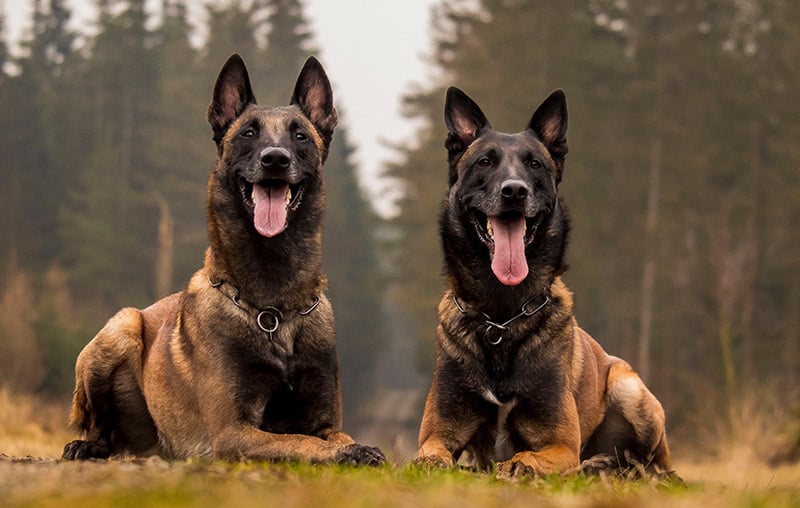In this article
Obviously, the word “dog” is used for our canine companions in English-speaking countries. But that doesn’t mean it’s a universal term—not by a long shot. In all languages, we have a word for these amazing creatures.
Are you ready to learn about them? You may want to quiz yourself on how many you already know. Without further ado, let’s get to know more about languages!

Where Does the English Word “Dog” Come From?
The English word “dog” is shortened from the Old English term “docga”. Interestingly, the word’s origin is unknown. Not only does each language have its own word for dog, but we have made up quite a few nicknames along the way as well.
What Are Other English Terms for Dogs?
Before we get into the awesome words for “dog” in different languages, let’s get to know a little bit more about the English terminology to describe our canine companions. Here is a list of words that also mean dog in English.
- Pooch
- Hound
- Mongrel
- Pup
- Puppy
- Doggy
- Man’s Best Friend
- Furbaby

How to Say “Dog” in the Most Commonly Spoken Languages Around the World
Behind English, these are the most common languages spoken in the world and how to say “dog” in each one.
- Mandarin Chinese: Gǒu
- Hindi: Kutte
- Spanish: Perro
- French: Chien
- Arabic: Calb
- Bengali (Bangla): Kukura
- Russian: Subaka
- Portuguese: Cachorro
- Urdu: Kutta
- Indonesia: Anjing
- German: Hund
- Japanese: Inu

How to Say “Dog” in the Other Languages
Because there are so many languages around the world, it is impossible to include all of them, but we tried to include as many unique languages as we could.
Here’s how to say “dog” in other less common languages, in alphabetical order. All words for “dog” were translated using Google Translate.
- Bulgarian: Kuche
- Burmese: Hkway
- Croatian: Pas
- Czech: Pes
- Danish: Hund
- Divehi: Kuhthaa
- Dutch: Hond
- Estonian: Koer
- Filipino: Aso
- Finnish: Koira
- Greek: Skýlos
- Haitian Creole: Chen
- Hawaiian: ʻīlio
- Hungarian: Kutya
- Icelandic: Hundur
- Irish: Madra
- Italian: Cane
- Korean: Gae
- Latin: Canis
- Maltese: Kelb
- Mongolian: Nokhoi
- Nepali: Kukura
- Norwegian: Hund
- Polish: Pies
- Romanian: Câine
- Samoan: Maile
- Serbian: Pas
- Slovenian: Pes
- Somali: Eey
- Swahili: Mbwa
- Swedish: Hund
- Tagalog: Aso
- Thai: Hmaa
- Turkish: Köpek
- Ukrainian: Pes
- Vietnamese: Chó
- Welsh: Ci
- Yiddish: Hunt


The 10 Fun Facts About Domestic Dogs
Now that you know how to say dog in almost any language, here is a quick set of facts you might not know about our canine buddies.
- All scientific names come from Latin. While Latin is a dead language, it still has extreme prevalence in the scientific community. The scientific name for dogs is Canis familiaris.
- Hypoallergenic dogs are a myth. No dog has ever truly hypoallergenic, no matter how little they shed or how much. “Hypoallergenic dogs” just have less dander that doesn’t quite affect humans with allergies as much as other breeds.
- You can pay to get your dog cloned for $50,000 or above.
- Human beings have 46 chromosomes in our body. Dogs beat us by a landslide, containing 78 chromosomes.
- Dogs that were bred for swimming often have webbed feet to help them navigate through the water.
- Dogs are capable of hearing extremely high pitched sounds that are totally inaudible to humans. That is one reason your dog might cry, and another reason why they are so sensitive to loud sounds like alarms and fireworks.
- Depending on their place of origin, dogs have evolved to adapt to the environment they were from.
- A dog’s nose print is as unique as a human fingerprint.
- Puppies eat twice as much as adult dogs due to their growing bodies.
- Modern day dogs as well as foxes, wolves, and jackals evolved from a creature called a Miaci.

Conclusion
So now you know how to say dog in a variety of languages around the world. Of course, this is not an exhaustive list, and several wonderful languages have their own unique names for dogs.
One thing is for certain: dogs have touched the hearts of people all over the world and any place you can imagine. Could you ever imagine life without dogs? It would be a pretty drab existence. Our special relationship propels us forward with man’s best friend by our side.
Featured Image Credit: Benjaminj88, Shutterstock




















